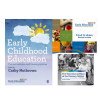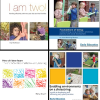Chapter 1: The centrality of play in early childhood
Back to overview of chapter resources Chapter authors Nancy Stewart Kierna Corr Julia Henderson Chapter overview Play is a fundamental in childhood, and enshrined as
This chapter explores the role of Children’s Centres (CCs) in serving the needs of disadvantaged children and families. The chapter first considers research on the way that poverty, minority status and family mental health are powerful influences on the life chances of children, pre- birth to old age (Eisenstadt and Oppenheim, 2019). All four nations within the UK tell a similar story, yet each has pursued different policies to combat the adverse effects of disadvantage. Children’s Centres are an exception, however, because all four nations have instituted some form of neighbourhood centres in poor communities to enhance the life chances of those who live in them (See Eisenstadt, 2011; Belsky et al., 2008). Next, the chapter provides a brief description of Children’s Centre policy in England, from the early 21st century, including a case study detailing the aims, staffing, and activities of Everton Children’s Centre, Liverpool. The chapter then focuses on the national picture in England, reporting the large scale national evaluation of the Sure Start Children’s Centre programme (Sammons et al, 2015a; Sylva et al., 2014), which demonstrated the beneficial effects for families. The chapter closes with discussion of recent research on the decline of Children’s Centres in England, and key issues for the future.

Back to overview of chapter resources Chapter authors Nancy Stewart Kierna Corr Julia Henderson Chapter overview Play is a fundamental in childhood, and enshrined as
Back to overview of chapter resources Chapter authors Verity Campbell- Barr Sasha Tregenza May Chapter overview In this chapter, we explore and analyse developments in
Back to overview of chapter resources Chapter authors Sue Allingham Nicola Brinning Chapter overview This chapter is built around the policy contexts of Wales and
Back to overview of chapter resources Chapter authors Alison Featherbe Louise Lloyd-Evans Helen Moylett Chapter overview In the early years, where our habits of mind
Back to overview of chapter resources Chapter authors Elizabeth Henderson Emma Gordon Helen McKinnon Jacqueline Bremner Maggie MacDonald Chapter overview Taking a Scottish perspective, this
Back to overview of chapter resources Chapter authors Cathy Nutbrown Becky Cook Chapter overview Early childhood education settings are increasingly, developing work with parents to
Back to overview of chapter resources Chapter authors Aline-Wendy Dunlop Lisa Barnes Myra McRobbie Chapter overview In this chapter we have chosen a transitions lens
Back to overview of chapter resources Chapter authors Jan Georgeson Emma Short Helen Adams Kate Ullman Chapter overview This chapter traces a brief history of
Back to overview of chapter resources Chapter authors Stella Louis Sally Cave Nasma Meah Chapter overview This chapter outlines what anti-discriminatory practice is and the
Back to overview of chapter resources Chapter authors Shaddai Tembo Fifi Benham Chapter overview This chapter examines the role of gender and LGBTQ+ inclusive practice
Back to overview of chapter resources Chapter authors Nathan Archer David Yates Chapter overview When considering the future, looking back at recent changes in the
Back to overview of chapter resources Chapter authors Elizabeth Wood Louise Kay Jessica Travers Chapter overview This chapter draws on international research to indicate how
Back to overview of chapter resources Chapter authors Cathy Nutbrown Beatrice Merrick Chapter overview This chapter is a little different from the others. It considers






Early Education
2 Victoria Square
St Albans
AL1 3TF
T: 01727 884925
E: office@early-education.org.uk